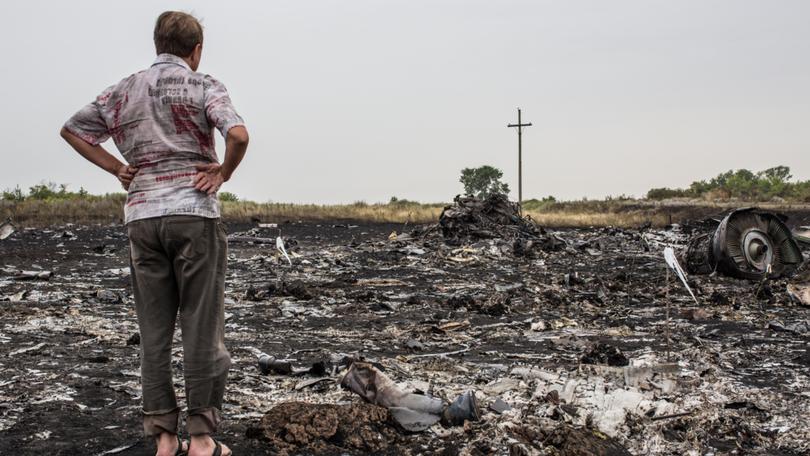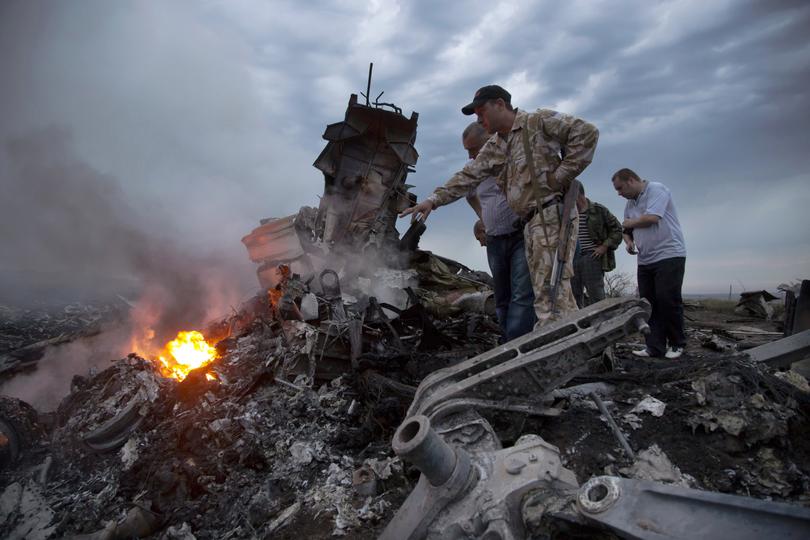Hugh Whitfeld reflects on MH17 10 years later: ‘So much was quite simply, wrong’
A deadly plane crash is an awful event. A deadly plane crash in a war zone is a crime, and justice hasn’t been served.

We were driving through Southern Israel having visited a hospital where Bedouin Israelis were being treated after a Hamas rocket attack.
It was July 17, 2014. War was raging in the Middle East, and Ukraine.
The late, great, Rob Brown — a veteran Seven News camera operator — was in the passenger seat.
Sign up to The Nightly's newsletters.
Get the first look at the digital newspaper, curated daily stories and breaking headlines delivered to your inbox.
By continuing you agree to our Terms and Privacy Policy.He was scrolling Twitter, and simply said: “Something’s happened to another Malaysian Airlines plane”.
My immediate response: “You mean MH370?”
Rob: “No, another one”.
By the time we made it back to our hotel in Jerusalem and turned on the TV, it was apparent that another tragedy had indeed occurred, but this time the wreckage had been found quickly, deep in a war zone.
I immediately called Seven’s then Foreign Editor, Ric Carter, waking him in Sydney to say a plane had gone down in Ukraine, it was flying from Amsterdam to Kuala Lumpur, there must have been Australians on board, I must be the closest, and we were going to go.
By the time we arrived in Kyiv early the next morning it was apparent that the Russian-backed rebels who controlled the self-declared Donetsk People’s Republic had thought they were shooting down a Ukrainian military plane, only to discover the remnants of a commercial airliner, and the bodies of the passengers and crew scattered across the countryside.
And indeed, that’s what we too discovered when we made it to the sunflower fields outside Hrabove 24 hours later. It was a chaotic journey being passed between a taxi driver, a part-time PR agent for the Ukrainian military, a few hours sleep in a Kharkiv hotel, a ride in a Ukrainian Army truck, and eventually another taxi driver who was brave enough to drive through the front lines of the war to collect us from Kramatorsk and drive us to Donetsk.
We travelled out to the crash scene on the morning of July 20 with forged accreditation from the fake Donetsk government, passing through a dozen or so check points manned by the vigilante rebels who’d seized control of the region. In the heat of the days they were mainly drunk on vodka. It was all they were really supplied by their superiors. We eventually learned that the best way to ease our way past their angry and unintelligible questions was to offer huge bottles of water to lubricate their eternal hangovers.
At the crash site so much was, quite simply, wrong.
I shouldn’t have been able to stand at the tail fin of the Malaysian Airlines plane reporting back to Australia about the so far, failing international efforts for independent investigators to reach the scene. It felt wrong, but I know it was the right thing to do. It was the right thing to expose to the world, and in particular Australia, the horrible injustice that had been and was being inflicted on the innocent lives that had been lost, and their mourning families.
It was wrong that the wreckage of the plane was spread over across 10 kilometres, exposed to the elements, with little effort to secure the scene.
When I found a Country Road bag lying in the grass, I knew that I was in the right place to begin a path to justice for families who up until that week had been just like mine: with a young son or daughter away on an adventure, hoping that they would return home safely. For so many Australian families, that simply didn’t happen.
It was wrong that the only people who travelled to the site were the international media trained for hostile environments, the Putin-backed rebels who had overthrown the local government, and a team from the Organisation for Security and Cooperation in Europe who were already on the ground as war monitors. The OSCE.
The OSCE took on a convening role, helping us as journalists explain to the world what was going on. But they couldn’t stop the rebel soldiers cruelly and haphazardly collecting up the remains of the passengers and crew into rubbish bags only to lie in the heat, waiting days for them to put on a Soviet era train to be taken to Kharkiv. They also couldn’t stop those rebels looting passengers’ belongings.
The stench of death was overwhelming for a week.
And all the while, the Russian-backed propaganda machine was in overdrive. Even at one point sending a blonde woman in a dress and heels to the crash site to try and convince reporters in broken English that the rocket that shot down the plane was actually Ukrainian. It wasn’t.

A handful of Australian Federal Police personnel eventually arrived. When we attempted to film their inspection of the cockpit wreckage, one of the rebel soldiers told us to leave by simply cocking his gun and pointing it at us.
Each night, I stood on the roof of our hotel in Donetsk - the only place safe enough to operate a satellite dish in the darkness - reporting back to Australia about the day’s tragic developments, with the sound of shelling on the horizon.
A deadly plane crash is an awful event. A deadly plane crash in a war zone is a crime, and justice hasn’t been served.
